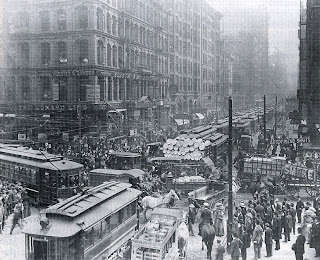The world is too much with us; late and soon,
Getting and spending, we lay waste our powers;
Little we see in Nature that is ours;
We have given our hearts away, a sordid boon!
This Sea that bares her bosom to the moon,
The winds that will be howling at all hours,
And are up-gathered now like sleeping flowers,
For this, for everything, we are out of tune;
It moves us not. --Great God! I'd rather be
A Pagan suckled in a creed outworn;
So might I, standing on this pleasant lea,
Have glimpses that would make me less forlorn;
Have sight of Proteus rising from the sea;
Or hear old Triton blow his wreathèd horn.
~William Wordsworth, 1807
(Pickering et. al. 1994)
 |
| Duquesne Steel Factories At Night, Pittsburg, Pennsylvania, c. 1900, Anonymous |
 |
| Traffic on Dearborn and Randolph, Chicago, Illinois, 1909 |
 |
| Triton Blowing his Horn - part of the Fontana di Trevi (Trevi Fountain), 1762, Baroque Genre, Rome, Italy, First designs were drafted by Bernini; however after Pope Urban VIII passed and Pope Clement XII became the new Pope Clement XII commissioned Nicola Salvi. Image retrieved from http://www.aviewoncities.com/rome/trevi.htm |
Even Wadsworth in 1807 saw the dangers to nature and the eco-system. Wadsworth wrote this about the dangers of the Industrial Revolution as losing sight of coexisting with nature and the destruction of the self via materialism.
It is interesting that the words Sea and Nature are capitalized in various places during this poem; to me it signifies that Wadsworth accepted them as individuals, per say, and not objects. Truer today than in 1807 is the actuality that industrial sites, “progress”, and materialism are removing us from our reality that we are part of nature and the lack of connection with nature is what Wadsworth was referring to when he wrote, “The world is too much with us; late and soon, / Getting and spending, we lay waste our powers: / Little we see in Nature that is ours…”.
Humans have powers that are often perceived to defy even the powers of nature, yet Wadsworth, a romantic and proponent of living in harmony with nature, knew in 1807 and we know in our day that this simply is not true. We have far too long attempted to maintain a façade of control over the forces of Nature, yet now she is fighting back. ~ fred
 |
| Nature V. Industry, Photography, 2010, Jeniffer Sams |
Poem from: Pickering, J.H., and J. D. Hoeper. Questions To Ask About Poetry. Literature. Edited by D. Anthony English. New York, NY: Macmillan Publishing Company, 1994.
For more information about Pollution and the pollution of the Industrial Revolution the History Channel's Water and Air Pollution Link - http://www.history.com/topics/water-and-air-pollution is a wonderful place to begin.

No comments:
Post a Comment